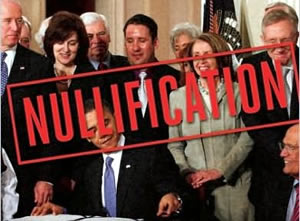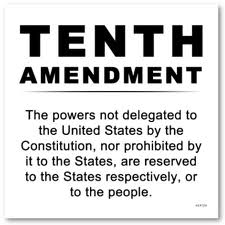

Here is the problem in a nutshell so to speak; there are two governments that make up the United States, the federal government and the state governments. The Constitution attempts to balance the powers of the two by enumerating those powers given to the federal government and those powers taken from the state governments. Powers not given to the federal government or taken from the state governments are powers reserved for the states. All should agree with these statements.
The problem arises when a law is passed by the federal government that may be unconstitutional because it involves an area not specifically given to the federal government in the Constitution, say for example healthcare. The Constitution says federal law is the supreme law of the land if it is constitutional. So who decides if it is constitutional?
The Supreme Court has taken on this task, but that is a branch of the federal government. So the federal government passes laws and decides if they are constitutional. Where is the state's or the people's protection? We could throw out the bums as we did in 2010 and elect representatives that will not pass laws we consider unconstitutional but that is too late for the laws are already in place and how do we know the new representatives will not violate our trust?
The Constitution is a legally binding contract between the federal government and we the people. Contracts do not evolve over time nor are they living documents that reflect ever changing attitudes. If the Supreme Court does not honor our contract and does not understand that one of its responsibilities is to “secure the blessings of liberty to the people and their posterity” then they become irrelevant concerning issues that diminish our liberty. We the people will have to seek other means to preserve our liberties. The best means available to us is through the state legislatures which we can influence and which have the capability to stand between the federal government and ourselves and ensure federal laws are constitutional.
State governments can protect we the people in a number of ways. One possibility is for each state to decide on its own if a law is constitutional and not make their citizens comply with laws that do not pass this test. If many states either acting alone or in concert pass laws nullifying a federal law, enforcement by the federal government of the law becomes difficult for two reasons. One is because of the impracticality of enforcing a very unpopular law in a large number of states actively resisting the law. This tactic is proving as an effective countermeasure to the Real Id Act of 2005 where some twenty five states have passed laws nullifying this law. Since then both the Bush and Obama administrations have delayed the implementation of the law given the enormity of enforcing it against such resistance. The law however still remains on the books. This tactic is now being attempted to thwart ObamaCare with maybe seven states passing resolutions or laws nullifying it in their states.
 The other reason, if many states nullify a federal law, that the law will not be implemented is a legal argument based on writing by Thomas Jefferson and James Madison who both claimed shortly after the Constitution was ratified that states can indeed decide if a federal law is unconstitutional. The Constitution enumerates the powers of the Supreme Court but it does not include explicitly in the list the power to decide the constitutionality of federal law. If the Supreme Court rules ObamaCare is constitutional in whole or in part then many more states may pass nullifying laws resulting possibly in the legal battle of all time. I can hardly wait. I wonder what court can decide a case where the Supreme Court is the plaintiff which they might be given it is their assumed power that is being ignored.
The other reason, if many states nullify a federal law, that the law will not be implemented is a legal argument based on writing by Thomas Jefferson and James Madison who both claimed shortly after the Constitution was ratified that states can indeed decide if a federal law is unconstitutional. The Constitution enumerates the powers of the Supreme Court but it does not include explicitly in the list the power to decide the constitutionality of federal law. If the Supreme Court rules ObamaCare is constitutional in whole or in part then many more states may pass nullifying laws resulting possibly in the legal battle of all time. I can hardly wait. I wonder what court can decide a case where the Supreme Court is the plaintiff which they might be given it is their assumed power that is being ignored.
State nullification is a tactic that gives no constitutional power to the states, who just take it and then see what happens. Not a bad idea but not one legally sanctioned unless the legal battle of all time decides the states have the power to nullify federal law. Otherwise, the only realistic means to grant the power to legally nullify federal legislature is by the states calling for a constitutional convention to propose an amendment to the constitution to grant such a power. A group of Republican legislators have introduced an amendment in congress that would allow two thirds of state's legislatures to nullify a federal law. Good luck with congress voting to reduce its power over the states. Also my feeling is that two thirds is too high a hurdle and the number should be just a majority which happens to be the number of states combining to challenge ObamaCare in court. If the hurdle is too high the likelihood of exercising this power will be remote and the federal government will sense no resistance to its laws. Further to get the required number of states for ratification I believe it is necessary that the federal government maintain the ultimate authority over the states in any proposal because I don't believe three quarters of the states agree that the Constitution gives sovereignty to the states over that of the federal government. For this reason I have proposed in a separate article giving a collective majority of the states a veto power similar to that of the President which can be overturned by a super majority vote of the federal congress.
There is a third means that state governments have to effectively nullify federal legislation and that is through interstate compacts which are nothing more than simply agreements between states. However, these agreements if approved by congress supersede federal law. A handful of states are developing compacts that give the states themselves the responsibility to provide for the regulation of healthcare for their citizens. These compacts need Congressional and Presidential approval so we the people have another reason to cast votes next year as if we needed more reasons.
 The constitutional convention route has problems to be sure. First it would take years to implement, some feel the convention might turn into a “run-away” convention that might create a whole new constitution, and perhaps most seriously the amendment might place in the Constitution the fact that only a majority or two thirds of the states acting collectively have the power to nullify a federal law. The benefits are that if passed it creates a legal means to stop the federal usurpation of the powers reserved to the states, the implementation or non-implementation is uniform among all the states, and federal legislatures would have to consider the input from state legislatures and we the people. If many of the states just nullify the laws as they are passed, there would be no reliable ongoing procedure unless it was deemed constitutional in some court. Also how would the country function with some states implementing a law and others nullifying it? But that process does not have any of the problems associated with the constitutional convention. Interstate compacts have all of the same benefits and concerns as nullifying the legislation except its legality cannot be questioned but it does require federal approval.
The constitutional convention route has problems to be sure. First it would take years to implement, some feel the convention might turn into a “run-away” convention that might create a whole new constitution, and perhaps most seriously the amendment might place in the Constitution the fact that only a majority or two thirds of the states acting collectively have the power to nullify a federal law. The benefits are that if passed it creates a legal means to stop the federal usurpation of the powers reserved to the states, the implementation or non-implementation is uniform among all the states, and federal legislatures would have to consider the input from state legislatures and we the people. If many of the states just nullify the laws as they are passed, there would be no reliable ongoing procedure unless it was deemed constitutional in some court. Also how would the country function with some states implementing a law and others nullifying it? But that process does not have any of the problems associated with the constitutional convention. Interstate compacts have all of the same benefits and concerns as nullifying the legislation except its legality cannot be questioned but it does require federal approval.
I believe it is too early to decide between the three approaches and all should be pursued. If state nullification works against ObamaCare, which will be a major test, and results in a workable health care system for the country then we should probably decide that is the preferred approach for the future. It allows individual states to decide which federal laws to implement within their states and if there are a sufficient number of states doing so enforcement by the federal government becomes impractical hopefully forcing modifications or repeal of the law. While these issues are being worked out, we should continue the backup plan providing a constitutional amendment allowing a veto that results in a uniform outcome among the states. If neither of these succeeds or remains practical and the election results are favorable perhaps interstate compacts will be the best way to permanently rid ourselves of a government takeover of our healthcare although future applications of this process will depend upon those in office at the time.
by Donald Mellon
October 19, 2011